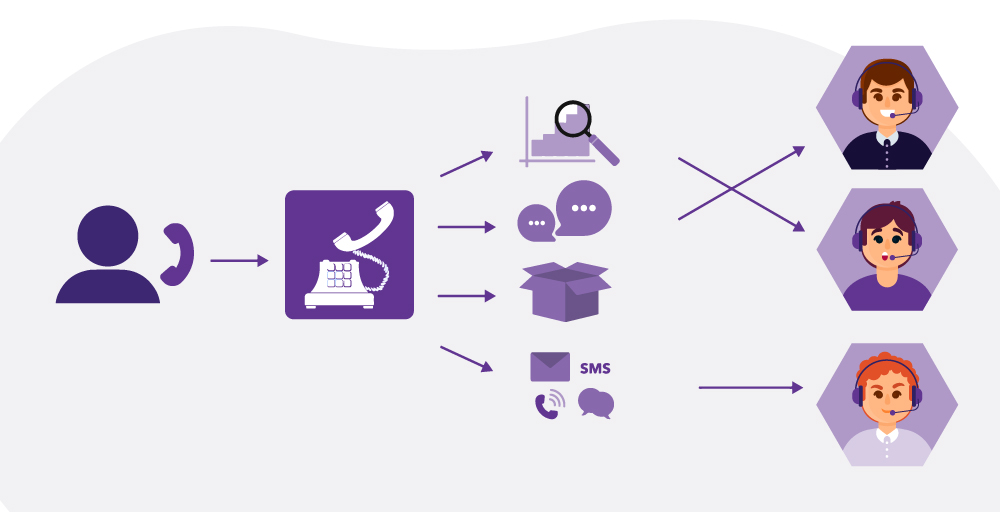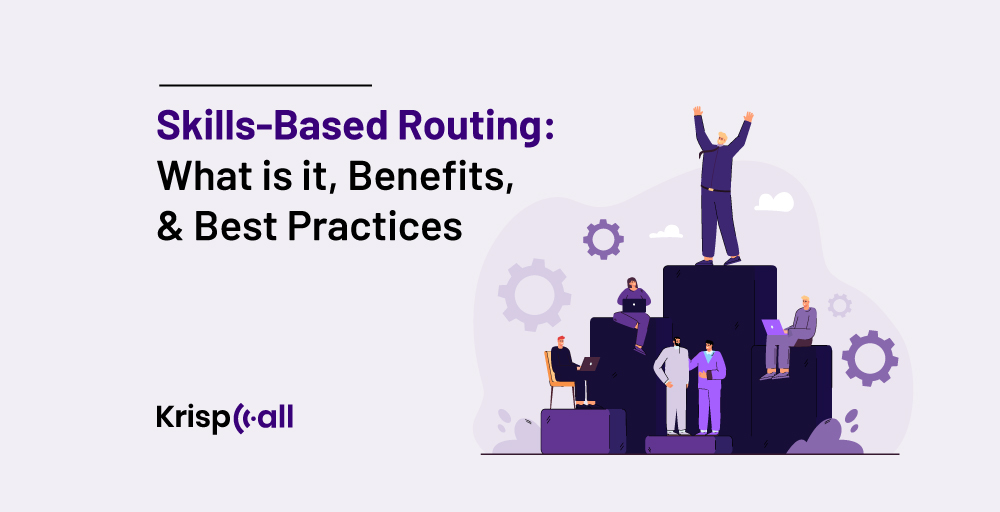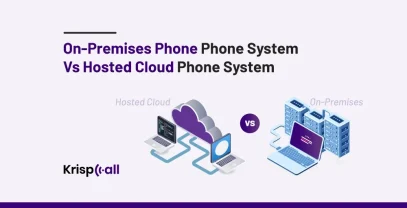Imagine calling your phone company with a specific issue, only to be bounced from one agent to another who cannot solve your problem.
It can be really 😫 frustrating when you are dealing with a problem and need quick help. That is where skill-based routing plays its role. Skill-based routing ensures that the customer’s call goes straight to the right person and that customer issues are solved quickly.
In this blog, you’ll learn about skills-based routing, including how it works, its benefits, and its best practices.
Let’s get started ▶️
🔑KEY HIGHLIGHTS
- Skill-based routing is a call routing strategy that assigns customers to agents who have the most relevant skills to handle their issues.
- Skill-based routing typically works by setting customers with an agent who is most qualified to solve the issue.
- It is essential for businesses because it allows them to enhance customer satisfaction and optimize their operation.
- To get the maximum benefits of skill-based routing, you need to identify agent skills based on customer data, configure routing rules, and maintain call distribution.
What is Skill Based Routing?
Skill-based routing is a 💡strategy of assigning calls to agents with particular skills to handle customers’ queries or problems. It makes sure that customers don’t keep getting passed around to different agents, making it more likely they’ll connect with someone who can actually help them.

Unlike redundant routing, which can lead to inefficiencies, skill-based routing ensures that each call is directed to the most qualified agent. It helps to improve customer satisfaction and operational efficiency.
For example, a phone company receives a call from a Japanese customer with a phone problem. Using a skill-based routing strategy, the system transfers the call to agents with that particular skill and distributes the call to one of them.
This way, the company can easily provide what the customer wants without confusing them by transferring them to different agents and satisfying customers on a single call.
Skills-based Routing Vs. Automatic Call Distribution
Skills-based routing and Automatic call distribution are both call routing strategies that effectively support and satisfy customers by providing a better assessment.
However, when it comes to executing these routing strategies, they are slightly different from each other.
Automatic call distribution routes call directly to the agents who are accessible at the moment without considering their skills. ACD is used in call centers to manage huge numbers of incoming calls from customers.
On the other hand, Skill-based routing routes customers’ calls to the right agents with particular skills to handle customers’ queries or problems. Skill-based routing basically focuses on providing a proper service on a single call.
How does a Skills-based Routing Work?
Skill-based routing typically works by setting customers with an agent who is most qualified to solve the issue. So, to provide a better match according to the customer’s preference, the business administration must set some routing rules and configurations. These rules ensure that incoming support requests go to agents who have the skills needed to solve the problem.
Here is how it typically works;
- Firstly, when a customer calls, the business system gathers information about the customer’s problem through IVR.
- Then, the system analyzes the availability of agents who are skilled at solving the customer’s problem.
- Agents who know routing rules route a call to the suitable agent or department that matches the customer’s request to the perfect agent.
- After that, the call will be routed to the agents who will assist the customer by providing solutions, product knowledge, and language abilities.
Skills-based routing aims to reduce the need to transfer customers between agents and improve first-call by connecting the customer directly with the most qualified agent.
Types of Skill-based Routing
There are three types of skill-based routing: standalone, Omnichannel, and priority. Each type has its own way of routing the call and providing quality service to the customer.
1. Standalone Skill-based Routing
Standalone skill-based routing is a type of routing in which the company categorizes the agent’s skills based on their language, product knowledge, experience, and location.
This method of categorizing agents helps a business identify relevant skills and knowledge for handling different types of support tickets. After diving agents according to their skills, standalone skill-based routing routes customer support tickets to the agent.
2. Omnichannel Skill-based Routing
Omnichannel skill-based routing is a type of skill-based routing that allows the business to directly assign customer tickets from different channels, such as email, phone, and other messaging applications.
This type of skill-based routing works by figuring out what skills are needed for each inquiry, following certain rules and setups, and then sending the inquiry to an available agent who has the skills to handle it.
3. Priority-based Routing
Priority-based routing is a type of routing that assigns inbound calls to agents based on the priority level of the customer. The priority level of the customer is determined by a few factors, such as the caller’s identity, At-risk customers, call purpose, and the call urgency.
The call center first uses skill-based routing to route the call and later uses priority-based routing based on caller priority.
In Skills-based Routing, What Roles and Processes are Used?
In skill-based routing, several roles and processes are involved to ensure that customers are fully satisfied with the right approach and direction.
- System administrator: A system administrator is a person who adds agents to the support system and assigns them to matching skill groups. The system admin also establishes the routing rules and automation so that the call goes to the right agents.
- Caller: A caller is a customer/prospect of the company. They call the company if they experience some issue and seek help and support from the company.
- Automation: When a customer calls, the system opens a ticket and submits a request. And automation routes the call to the agents who can solve the problem of the customer.
- Skilled agents: Finally, the customer’s call is routed to the skilled agents, and if an agent is busy at the moment, the customer will be placed in a queue.
These key roles and processes are essential to improving the customer experience and overall customer satisfaction.
Why does Business Require Skill-based Routing?
Skill-based routing is essential for businesses because it allows them to enhance customer satisfaction and optimize their operation. Here are some ideas as to why businesses need skill-based routing;
- Improves customer experience: Skill-based routing connects customers with skilled agents who can solve issues. An agent can solve the problem in a single call and improve the customer’s overall experience.
- Improve agent efficiency: Skill-based routing can improve agents’ overall performance by letting them handle a call in which they excel. This allows them to assist more people more efficiently.
- Enhance agent’s job satisfaction: As skill-based routing allows agents to work on a subject they are best at, it helps agents build confidence in answering customer queries.
- Solve a problem in a single call: With a skill-based routing strategy, a business can resolve the customer’s problem and queries in a single call without bumping them for a follow-up.
Benefits of Skills-based Routing
Now that we have learned about all the aspects of skill-based routing and how it actually works in business. It is time to understand how skill-based routing benefits businesses. Let’s start it;
Improves Customer Experience and Satisfaction
Skill-based routing helps businesses to improve overall customer experience and satisfaction. With skill-based distribution in the system, a company can increase single-call resolution, maintain customer expectations, and lower average handle time. All this helps businesses boost customer experience and satisfaction.
Improve Agents Performance
Skill-based routing categorizes agents based on their skills. It can increase agent productivity and motivation, as agents only have to focus on the things they are good at. This leads to happier agents who can confidently provide a better answer and satisfy customers with their performance.
Resolve Problem Faster
As we all know, skill-based routing routes a caller’s call to an agent who has the ability, skill, and experience to solve the particular caller’s problem quickly. Thus, businesses can provide a better solution in a single call for any issue or query that customers have.
Minimize Agent Training
With the skill-based routing method, businesses do not have to focus on training agents for expertise in all the topics. They can simply categorize or hire agents based on the skills they already have and are experts in. Agents can utilize their skills, such as language, expertise, and knowledge.
Skills-based Routing Best Practices
Businesses can maximize productivity and boost customer satisfaction by implementing some of the top best practices that we have listed.
Identify Agent Skills Based on Customer Data
First, businesses should always identify and hire agents with skills relevant to their business and their customers. If a business has customers from all over the world, then the company certainly needs an agent who can speak as many languages as possible.
Maintain Call Distribution
Businesses should always maintain call distribution and set up routing rules to ensure that there are enough agents to handle a large number of incoming calls. And if you have a few agents with the specific skill to solve the issue, then you should consider increasing an agent’s number.
Configure your Routing Rules and Triggers
Once you determine an agent’s skills and customer data, it’s time to set up routing rules in a business system. Routing rules streamline all your internal work and distribute calls to agents based on their skills. Similarly, triggers determine what action to take when a particular event happens.
Monitor and Evaluate the Overall Result
Finally, you should monitor and evaluate the overall performance of skill-based routing. Businesses should measure things like first call resolution, average handle time, customer satisfaction, and agents’ performance to measure the impact of skills-based routing on their business.
Conclusion
Skills-based routing is a powerful tool for businesses to enhance customer satisfaction and operational efficiency. By matching customer inquiries with the most qualified agents, companies can minimize wait times, increase first-call resolutions, and ultimately improve the overall customer experience.
However, to maximize the effectiveness of skills-based routing systems, businesses need to follow some best practices, which include setting clear routing rules, providing agent training, and regularly monitoring performance. With this approach, companies can adapt to their customers’ changing needs in today’s fast-paced, omnichannel environment, resulting in long-term success and growth.
FAQs
Why is skills-based routing essential?
Skills-based routing is essential because it helps companies connect customers with the right person to help them. Instead of bouncing around to different agents, customers get directed straight to someone who knows how to solve their problem. This saves time and frustration for everyone involved, making for happier customers and smoother operations overall.
What are the differences between skills-based routing vs. queue-based routing?
In Skill-based routing, the system sends customer tickets to the skilled agent, whereas in queue-based routing, the system sends customer tickets to the next available agent.
How to set up a skills-based routing in a contact center?
To set up skills-based routing in a contact center, a business should first determine its agents’ skills. Then, they must decide what kinds of calls are most important and how they should be prioritized. After that, they can create rules for routing calls and set up the system to do it automatically.
What metrics should be tracked to know the effectiveness of skills-based routing?
Metrics, such as average handle time, service level, customer satisfaction, and first call resolution, should be tracked to know the effectiveness of skills-based routing. By measuring these metrics, organizations can effectively implement skills-based routing in their contact centers to maximize their sales and customer support.
How does skill-based routing impact customer satisfaction?
Skill-based routing reduces customer wait times, solves their problem quickly and accurately, and resolves their issue in one call, reducing the need for multiple contacts.





